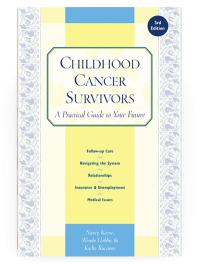Childhood Cancer Survivors
Future planning
Cancer treatment forces many children and their families to drop their plans for the future to focus on surviving the present. When treatment ends, an adjustment in mindset occurs. Some survivors resume working toward their pre-cancer goals—athletics, studies, relationships. Others find that they avoid thinking about the future because expectations of a long, healthy life have been changed by the cancer diagnosis. Commitment to a relationship or a long-term goal may be difficult. Thinking about having children may become more complicated. If future planning has become a daunting task, joining a support group or getting counseling may help you cope with altered perceptions of your future.
After my daughter’s transplant we all felt like she had beaten the cancer. We did know many children who died—but there were reasons why we thought their situation differed from ours. For instance, we knew babies didn’t do as well, so when a baby died, it didn’t shake our optimism. But she befriended another teen who had a transplant for AML who really wanted to live. He was a great kid and they became close. When he passed away, it really hit us hard. She said, “Everything he felt, I feel too. I might really die from this disease.” We had to rethink a lot of things.
When she had to write an essay on what she would do if she won the monetary prize at a piano competition, she wrote, “I will use the money for a music camp or college, if I go.” When I asked her if she was talking about if she lived that long, she said, “Yes.” She doesn’t say a lot about her concerns, but it’s her reality. But we are learning to live in spite of that.
• • • • •
Even now, 20 years later, I have a sense that I’ll never get old. I just believe that I am going to die young. So I really don’t plan for the future. It’s too much of an unknown. I don’t know if the left ventricle of my heart will continue to deteriorate. Or if my liver will hold up. There are too many things that I just don’t know.
Sometimes survivors have to alter their life plans because cognitive or physical disabilities truly limit future possibilities. It can be very difficult for survivors, their families, and friends to accept that the price they paid for life has irrevocably changed the future.
In contrast, sometimes the cancer experience provides different views of the future. For example, cancer often gives children or teens their first glimpse of the medical world. Exposure to the helping professions and the medical world sometimes sparks an interest in youngsters that blossoms into a career.
I became a nurse as a result of having Wilms tumor when I was 2 years old. I had so much contact with the medical field that I became fascinated with it. I started out in adult intensive care, and then did pediatric home healthcare. One of the great things about nursing is that you can jump around and do all sorts of different things.
• • • • •
My cancer changed my career aspirations. When I was a teenager I wanted to be a cop, but after cancer I decided to be a doctor. Treatment expanded my horizons by plopping me right into the middle of exciting times in the scientific community. I was diagnosed with ALL 25 years ago and was one of the first to get treatments that resulted in survival. Once I went to college, I was enjoying life too much to really focus and concentrate on getting into medical school, so I became a physician assistant.
Table of Contents
All Guides- 1. Survivorship
- 2. Emotions
- 3. Relationships
- 4. Navigating the System
- 5. Staying Healthy
- 6. Diseases
- 7. Fatigue
- 8. Brain and Nerves
- 9. Hormone-Producing Glands
- 10. Eyes and Ears
- 11. Head and Neck
- 12. Heart and Blood Vessels
- 13. Lungs
- 14. Kidneys, Bladder, and Genitals
- 15. Liver, Stomach, and Intestines
- 16. Immune System
- 17. Muscles and Bones
- 18. Skin, Breasts, and Hair
- 19. Second Cancers
- 20. Homage
- Appendix A. Survivor Sketches
- Appendix B. Resources
- Appendix C. References
- Appendix D. About the Authors
- Appendix E. Childhood Cancer Guides (TM)

